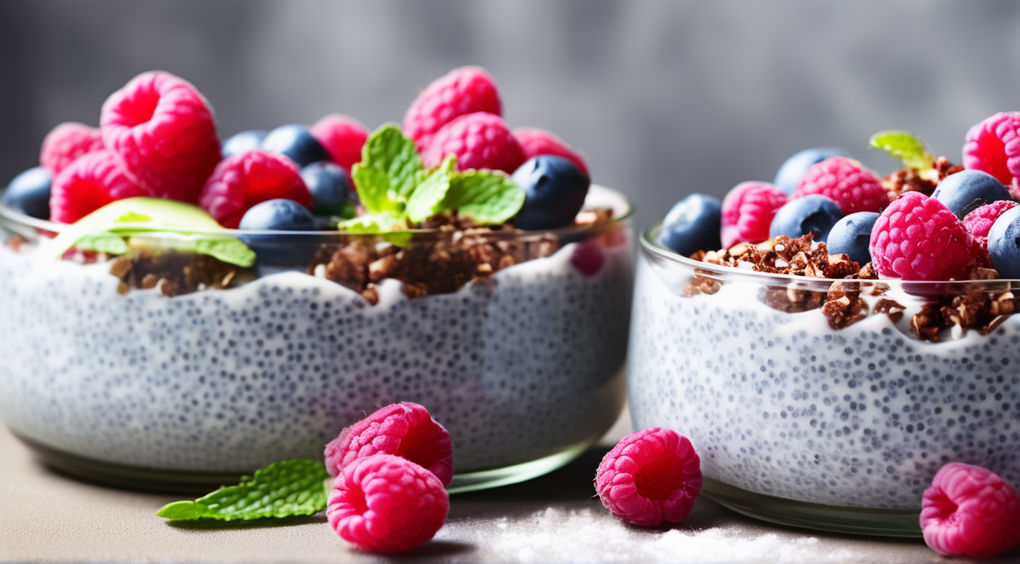Benefits of Chia Seeds Video
Chia seeds, tiny in size but enormous in nutritional value, have taken the health food world by storm. Originating from the Salvia hispanica plant, native to central and southern Mexico, these seeds were a staple in the diets of ancient civilizations like the Aztecs and Mayans. The word "chia" even translates to "strength" in Mayan, reflecting the energy and endurance it provided to these ancient cultures. Today, chia seeds are celebrated for their versatile health benefits, from improving digestive health to supporting heart health.
Chia Seeds: Ancient Superfood for Modern Health
Nutritional Profile of Chia Seeds
Chia seeds are a powerhouse of nutrition packed into small, edible seeds. A mere one-ounce (28 grams) serving contains:
- - Calories: 137 kcal
- - Protein: 4 grams
- - Fat: 9 grams (5 of which are Omega-3s)
- - Fiber: 10 grams
- - Calcium: 177 mg
- - Magnesium: 93 mg
- - Phosphorus: 242 mg
They also contain a decent amount of Zinc, Vitamin B3 (Niacin), Potassium, Vitamin B1 (Thiamine), and Vitamin B2.
Top Health Benefits of Chia Seeds
-
1. Rich in Antioxidants: Chia seeds are loaded with antioxidants that help protect the body's cells from free radicals and oxidative stress, potentially reducing the risk of chronic diseases.
-
2. Promotes Digestive Health: The high fiber content in chia seeds aids in promoting regularity and supporting a healthy digestive tract. This soluble fiber also acts as a prebiotic, feeding beneficial gut bacteria.
-
3. Supports Heart Health: Chia seeds are rich in omega-3 fatty acids, particularly alpha-linolenic acid (ALA), which are known to reduce inflammation, lower cholesterol levels, and decrease the risk of heart disease.
-
4. Strengthens Bones: Being a good source of calcium, magnesium, and phosphorus, chia seeds contribute to bone mineral density, supporting bone health and preventing osteoporosis.
-
5. Enhances Blood Sugar Control: The unique combination of soluble fiber and protein can help regulate blood sugar levels, making chia seeds a beneficial addition to the diet of people with diabetes.
-
6. Aids in Weight Management: The fiber and protein in chia seeds can help reduce appetite and food intake by making you feel fuller for longer, supporting weight loss efforts.
-
7. Easy to Incorporate into Diet: Chia seeds have a mild, nutty flavor and can be added to various dishes, including smoothies, yogurt, salads, and baked goods, making them an easy superfood to incorporate into your diet.
-
8. Boosts Energy and Exercise Performance: Chia seeds were known as "runner's food" for their ability to provide sustained energy. Their balanced blend of protein, fats, and fiber can enhance exercise performance, similar to a sports drink.

Incorporating Chia Seeds into Your Diet
Chia seeds are incredibly versatile and can be added to a variety of dishes:
- - Puddings: Soak in milk or almond milk overnight with a sweetener to create a pudding-like consistency.
- - Smoothies: Add a spoonful to your morning smoothie for a nutrient boost.
- - Baked Goods: Use as an egg substitute or simply mix into bread, muffins, and pancakes.
- - Salads: Sprinkle over salads for a crunchy texture.
- - Yogurt: Mix into yogurt or oatmeal for added fiber and nutrients.
Conclusion
Chia seeds are more than just a trendy superfood; they're a nutritional powerhouse with a wide array of health benefits. Whether you're looking to boost your protein intake, improve heart health, or support weight loss, incorporating chia seeds into your diet is a simple yet effective way to enhance your overall well-being. Remember, though, that no single food can provide all the answers to health, and it's essential to maintain a balanced diet and lifestyle.
Disclaimer: This article is for informational purposes only and is not intended to replace professional medical advice, diagnosis, or treatment. While chia seeds offer numerous health benefits, it's essential to consume them in moderation as part of a balanced diet. Always seek the advice of your physician or another qualified health provider with any questions you may have regarding a medical condition.
References
1. Harvard Health Publishing. Are certain types of sugars healthier than others?. https://www.health.harvard.edu/blog/are-certain-types-of-sugars-healthier-than-others-2019052916699
2. Kulczyński B, Kobus-Cisowska J, Taczanowski M, Kmiecik D, Gramza-Michałowska A. The Chemical Composition and Nutritional Value of Chia Seeds-Current State of Knowledge. Nutrients. 2019 May 31;11(6):1242. doi: 10.3390/nu11061242. PMID: 31159190; PMCID: PMC6627181.
3. USDA FoodData Central. Chia seeds. https://fdc.nal.usda.gov/fdc-app.html#/food-details/1100612/nutrients
4. de Souza Ferreira C, de Sousa Fomes LD, Espirito Santo da Silva G, Rosa G. Effect of chia seed (Salvia hispanica L.) consumption on cardiovascular risk factors in humans: a systematic review. Nutricion hospitalaria. 2015;32(5).
5. Lemaitre RN, King IB, Mozaffarian D, Kuller LH, Tracy RP, Siscovick DS. n− 3 Polyunsaturated fatty acids, fatal ischemic heart disease, and nonfatal myocardial infarction in older adults: the Cardiovascular Health Study. Am J Clin Nutr. 2003 Feb 1;77(2):319-25.
6. Michigan State University Extension. Chia seeds. https://www.canr.msu.edu/news/chia_seeds
Ready to level-up?
Create meal plans 10x faster, follow up with your clients through our mobile app, and never struggle with meal planning or recipe management again.